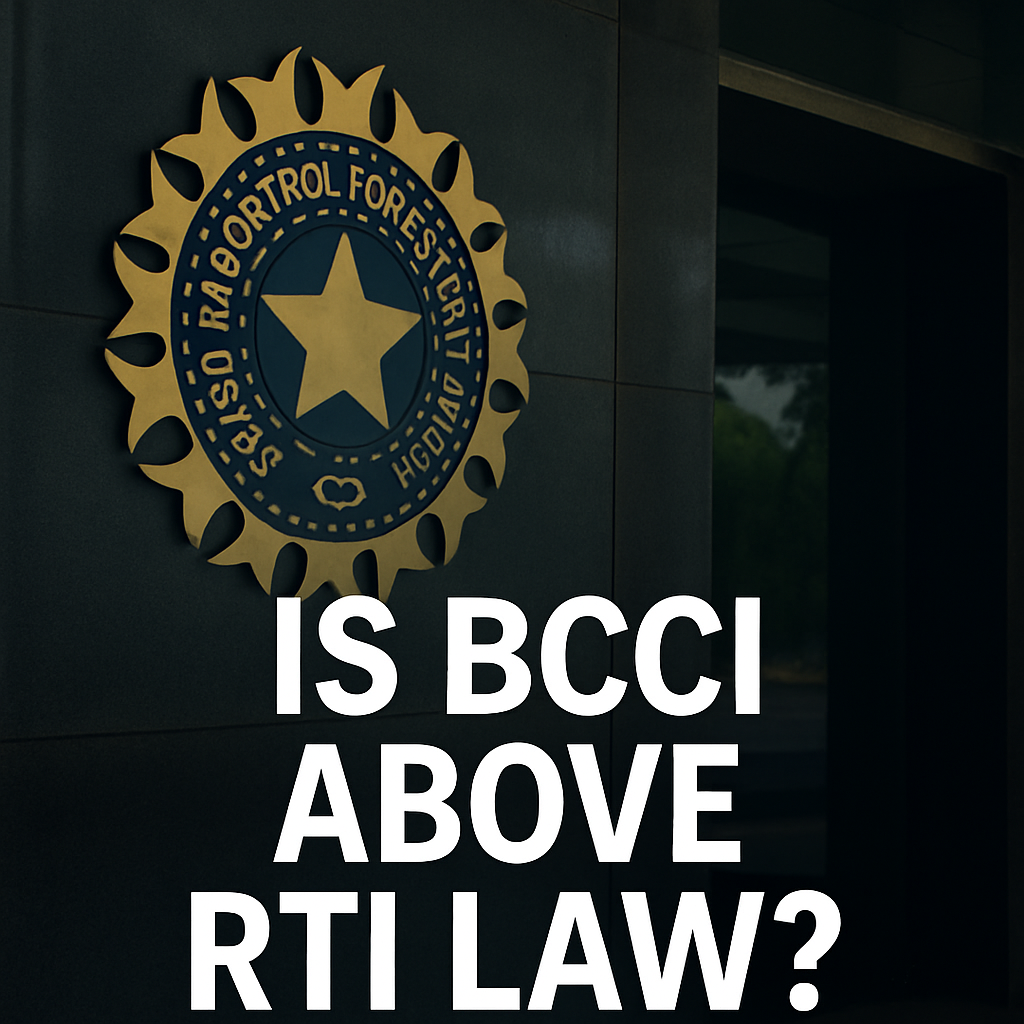
In a country where cricket is often equated with religion, the Board of Control for Cricket in India (BCCI) enjoys near divine immunity. While the BCCI wields immense influence over India’s most beloved sport, its record of transparency and public accountability has long been questioned. Now, a proposed amendment to the newly introduced National Sports Governance Bill, 2025 could ensure that this influential body remains outside the ambit of the Right to Information (RTI) Act, further shielding it from public scrutiny.
The draft clause in question states that only those “sports organizations receiving grants or financial assistance from the Central or State Government” shall be covered under the RTI Act. Since the BCCI claims it does not receive any direct government funding, it should not be held accountable under the RTI law.
But this logic is deeply flawed and dangerous.
BCCI’s Financial Firewall: A Legal Loophole or Shield of Convenience?
The BCCI has consistently maintained that it operates as a private body and does not rely on public funds. However, this claim ignores the significant indirect support the BCCI receives such as subsidized stadium land, match-day security, tax exemptions, and preferential access to infrastructure.
Moreover, cricket in India is not just a private entertainment industry. It is a national obsession that heavily influences public sentiment, government policies, and international diplomacy. Any organization that controls such a powerful cultural institution must be held to a higher standard of transparency.
If the BCCI continues to be excluded from the RTI framework, it essentially means the cricket-loving public will remain in the dark about how the body functions, how decisions are made, and where the money flows. In an era when transparency is a prerequisite for institutional trust, this opacity is deeply concerning.
Supreme Court and CIC Have Already Set the Precedent
It’s worth noting that this debate isn’t new. In 2018, the Central Information Commission (CIC), India’s top RTI body, ruled that the BCCI is a public authority under the RTI Act. The judgment cited BCCI’s monopoly over cricket administration, its role in selecting the national team, and the substantial state support it receives. The Supreme Court, too, has echoed similar sentiments, especially in the Lodha Committee reforms, which aimed to bring the BCCI in line with principles of transparency and democratic functioning.
Yet, despite such clear directions, the BCCI filed a petition in the Madras High Court to evade RTI obligations. Many legal experts and activists saw this as a regressive step
Governance Without Accountability: A Dangerous Precedent
Allowing the BCCI to operate beyond the reach of RTI sets a poor precedent. It suggests that powerful bodies can avoid transparency by simply avoiding direct state funding. This interpretation could embolden other federations to reorganise their finances to slip out of public accountability frameworks.
Moreover, the RTI Act was never intended to cover only financial dealings with the government. It was enacted to ensure that bodies performing public functions are held accountable to the public. BCCI’s influence on national selection, international cricket diplomacy, anti-doping compliance, and sports policy makes it a de facto public body.
By remaining outside the RTI, the BCCI avoids answering uncomfortable questions: How are IPL franchises regulated? What is the selection criteria for national teams? What disciplinary procedures are followed? Who decides sponsorship deals and broadcasting rights? These are not just private concerns; they affect millions of fans and billions of rupees in economic activity.
Opposition Voices JPC for Sports Bills
Recognizing the dangers of this move, several opposition MPs have written to Lok Sabha Speaker Om Birla seeking a Joint Parliamentary Committee (JPC) to discuss the Sports Governance Bill and the Anti-Doping Bill. Their letter argues that wide-ranging proposals like ethical oversight and broader review.
The MPs rightly argue that shielding BCCI from the RTI Act could have serious implications for India’s international standing in sports governance and transparency. With India set to host major events like the 2036 Olympics (if the bid succeeds), maintaining ethical governance in sports bodies is more urgent than ever.
Redefining “Public Authority” in a New Sports Economy
The proposed clause risks shrinking the definition of “public authority” to only those who receive visible, direct financial grants This narrow view ignores how governance operates in reality, especially in sectors like sports, where public infrastructure, national branding, and public trust are as important as budgetary allocations.
The logic here is akin to arguing that a private school built on subsidized land and granted tax exemptions by the state is not accountable to the public simply because it doesn’t receive a cheque from the government. Such reasoning can only be described as legal gymnastics.
Reform Or Another Missed Opportunity?
Ironically, the same bill that threatens to exclude BCCI from RTI ambit also proposes creating a National Sports Board (NSB) and National Sports Tribunal (NST) to ensure fair recognition, dispute resolution, and disciplinary action. If implemented rigorously, this framework could introduce some level of institutional accountability.
However, unless RTI compliance is enforced, these reforms will remain superficial. Legal bodies without public scrutiny are like umpiring without cameras—errors can be covered up, and decisions manipulated.
Final Take: Transparency Is a Right
At the heart of this issue lies a simple principle: cricket belongs to the people. The BCCI is its custodian, not its owner. Shielding it from RTI protection is not just a technical tweak in a draft bill—it’s a betrayal of public trust.
As Indian cricket continues to grow in wealth and influence, its governance must evolve to match. The government must reconsider this clause and listen to public sentiment. Transparency isn’t an attack—it’s the foundation of trust. And any institution, no matter how powerful, must be held accountable when it serves the public good.
In the spirit of democracy and the love of cricket, India must ensure that no pitch is too protected to inspect, and no scoreboard too sacred to question.





















